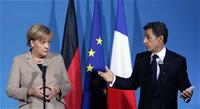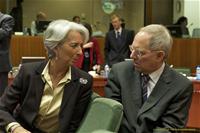Germany for all, all against Germany
Ralitsa Kovacheva, December 8, 2010
 The crisis in the euro area led to collisions of various opinions on how the euro could be saved, but it clearly showed one thing: everyone is relying on Germany and everybody blames Germany. Since I am neither an economist, nor a politician, but a journalist and I see things neither from Berlin nor Brussels, but from Sofia, I will dare some frivolity while searching for the answer where is the salvation of the euro.
The crisis in the euro area led to collisions of various opinions on how the euro could be saved, but it clearly showed one thing: everyone is relying on Germany and everybody blames Germany. Since I am neither an economist, nor a politician, but a journalist and I see things neither from Berlin nor Brussels, but from Sofia, I will dare some frivolity while searching for the answer where is the salvation of the euro.
Because I think that this is no less philosophical question than, as it turned out, the market economy for example - apparently, politicians took advantage of the crisis to demand more state intervention in the market. And more rights for the state - of course, represented by politicians. Do we still believe in the principles which until recently were considered indisputable and fundamental to the Western society?
The critics
On the one hand, everyone is relying on Germany because the country is the largest donor in the rescue fund for the euro area and this is undeniable. On the other hand, however, it is more complicated - Germany is being accused of all sins associated with both the history and the present of the euro. Many people, especially in the currently troubled peripheral economies in the euro area, accused Berlin that it had benefited from the single currency to boost its exports at their expense and that the current crisis was a result of the German selfish behaviour.
Germany has incurred the anger of those peripheral economies, as well as of some European institutions and analysts, according to whom its insistence private creditors to take their part in the risk, related to sovereign debt, has unleashed market panic. Interest rates pressure on Greece, Ireland, Spain and Portugal increased to the extent that Ireland had asked for help the EU and the IMF, and according to rumours the crisis is already crawling towards Portugal, Spain, Italy and even France. The analysts have already started openly predicting a default of Greece.
The euro-federalists also benefited from the situation, accusing Germany that it  was its refusal to transfer more powers from national to European institutions that left the single currency without the coverage of a common economic policy. In this respect, one of the most consistent critics of Berlin is Guy Verhofstadt, the leader of the Group of the Alliance of Liberals and Democrats for Europe in the European Parliament. He sharply criticised Germany that “blinded by the economic success that it is currently notching up, Germany trembles at the thought of transferring more tasks to Brussels and thus handing over more of Berlin’s decision-making power.“
was its refusal to transfer more powers from national to European institutions that left the single currency without the coverage of a common economic policy. In this respect, one of the most consistent critics of Berlin is Guy Verhofstadt, the leader of the Group of the Alliance of Liberals and Democrats for Europe in the European Parliament. He sharply criticised Germany that “blinded by the economic success that it is currently notching up, Germany trembles at the thought of transferring more tasks to Brussels and thus handing over more of Berlin’s decision-making power.“
Berlin is talking
 Undoubtedly we can say that German Chancellor Angela Merkel is the most influential European politician at the moment. Reserved but firm, the "Teflon Lady" is a strange couple with the impulsive, but calculating French President Nicolas Sarkozy. The fact is that since the beginning of the debt crisis in the eurozone, they openly took its governance into their own hands. And that makes some Member States pretty nervous, as well as the European Parliament. The Commission's President, José Manuel Barroso, is clenching his teeth, though at times he is sifting little disagreement through.
Undoubtedly we can say that German Chancellor Angela Merkel is the most influential European politician at the moment. Reserved but firm, the "Teflon Lady" is a strange couple with the impulsive, but calculating French President Nicolas Sarkozy. The fact is that since the beginning of the debt crisis in the eurozone, they openly took its governance into their own hands. And that makes some Member States pretty nervous, as well as the European Parliament. The Commission's President, José Manuel Barroso, is clenching his teeth, though at times he is sifting little disagreement through.
The Financial Times published an interview with German Finance Minister Wolfgang Schäuble, designated by the newspaper as a finance minister of the year (I think they could have awarded a team prize to him and Ms Merkel, even given the disputes between them on some of the most important issues).
The interview of Mr Schäuble is significant, because it gives answers to many of  the charges against Germany and it also shows a more comprehensive perspective, beyond the specific economic problems. He advocates the model of European integration and defines it as a very modern, precisely because not everything should be harmonised. According to him, the question is to look for solutions beyond national sovereignty. But “as long as we have a national competence for fiscal policy, we cannot give up the instruments for incentives and sanctions for members of the eurozone, [to ensure] discipline in their national budget policies”.
the charges against Germany and it also shows a more comprehensive perspective, beyond the specific economic problems. He advocates the model of European integration and defines it as a very modern, precisely because not everything should be harmonised. According to him, the question is to look for solutions beyond national sovereignty. But “as long as we have a national competence for fiscal policy, we cannot give up the instruments for incentives and sanctions for members of the eurozone, [to ensure] discipline in their national budget policies”.
Schäuble, however, is optimistic that in the long term the euro area countries, including Germany, will be prepared to cede more of their national budget authorities. Moreover, according to Wolfgang Schäuble, given their history after 1945 “for Germans it is relatively easy to understand that national sovereignty itself is not a tool of the 21 century. It is more difficult for other countries.” The fact is that Germany is one of the founders of the European Community, fully realising that one of the motives of the others was "if Germany would be strong, better be on our side."
In the same vein, Wolfgang Schäuble commented the German request private creditors to assume not only the profits, but also the risks associated with government debt. The point is that we not simply insure ourselves and solve the current difficult situation, but it comes to defending the fundamental market principle: “In any market economy there has to be a relationship between risk and opportunity, otherwise it would fail and we would lose any support for the legitimacy of our economic and, in the end, of our political order.”
The forgotten solidarity
Do we remember at all what our political and economic order was? When I say our, I perfectly realise that it was never an acknowledged value for Bulgaria, which is one of the reasons for the country to loose its way so easily and for so long. Because Bulgaria joined the European Union only institutionally but not in mentality. And Bulgaria is not the only one. What's worse is that, due to the prosperity and welfare, achieved exactly because of the Union, many European countries have forgotten the values that underpin the European idea.
 The crisis in the euro area is a part of a deeper problem of the European Union and it is not just economic. This situation is fundamentally at odds with the concept of the Union. Going back to the reasons for its creation, we see that they are fully subordinated to the idea of mutual cooperation among economically and politically similar countries, in order for everyone to contribute with its value for the common good. Countries, expressing solidarity in the true sense of the word - share common values and aspirations and are committed to work together to achieve them.
The crisis in the euro area is a part of a deeper problem of the European Union and it is not just economic. This situation is fundamentally at odds with the concept of the Union. Going back to the reasons for its creation, we see that they are fully subordinated to the idea of mutual cooperation among economically and politically similar countries, in order for everyone to contribute with its value for the common good. Countries, expressing solidarity in the true sense of the word - share common values and aspirations and are committed to work together to achieve them.
This concept has proved its effectiveness over time. While the Union, gaining a new confidence and vigour, had not decided to accept other countries - different economically and in terms of mentality. There was a noble attempt these countries to be involved in the Community. Recently I have read the memoirs of regional policy founders, who had recognised their failure to teach Greece, for example, to do programme budgeting or how to invest its funds with a vision for the future. Through co-financing new Member States had to learn using their own budgetary resources in a no less accountable way than European funds. The fact is that this has not happened.
I am far from thinking that the enlargement of the EU to its present periphery  had only idealistic and noble motives. Maybe this is one of the reasons for the current situation, where the euro area and the EU in general are facing an unfamiliar challenge: to find a way to punish member states, to compel them to do something for themselves and for others too. The Founding Fathers of the EU have hardly imagined that it was possible a Member State to tamper with its statistical data to mimic financial stability. They hardly believed that from a cause the European Union had become a supervisor.
had only idealistic and noble motives. Maybe this is one of the reasons for the current situation, where the euro area and the EU in general are facing an unfamiliar challenge: to find a way to punish member states, to compel them to do something for themselves and for others too. The Founding Fathers of the EU have hardly imagined that it was possible a Member State to tamper with its statistical data to mimic financial stability. They hardly believed that from a cause the European Union had become a supervisor.
That's why it is difficult now to find working sanctioning mechanisms. That's why the calls for solidarity do not work, because this solidarity is only ostensible, institutional. The case "Germany saves all", so "all are against Germany”, when it is refusing to do so indefinitely, is an eloquent manifestation of precisely this lack.
 I personally would not accuse the Germans in an absence of solidarity. Rather, I am critical of those who took without giving. Because obviously the true solidarity of a community of nations with common desire for prosperity has simply not happened. Therefore, even if it survives economically, in the long run and from this perspective, the euro area is questionable. As is the entire European Union. Unless the saving of values does not become a priority just like saving the economies.
I personally would not accuse the Germans in an absence of solidarity. Rather, I am critical of those who took without giving. Because obviously the true solidarity of a community of nations with common desire for prosperity has simply not happened. Therefore, even if it survives economically, in the long run and from this perspective, the euro area is questionable. As is the entire European Union. Unless the saving of values does not become a priority just like saving the economies.
 Klaus Regling | © Council of the EU
Klaus Regling | © Council of the EU Mario Centeno | © Council of the EU
Mario Centeno | © Council of the EU Mario Centeno | © Council of the EU
Mario Centeno | © Council of the EU Angela Merkel, Emmanuel Macron | © Council of the EU
Angela Merkel, Emmanuel Macron | © Council of the EU Benoit Coeure | © Council of the EU
Benoit Coeure | © Council of the EU Pierre Moscovici | © Council of the EU
Pierre Moscovici | © Council of the EU